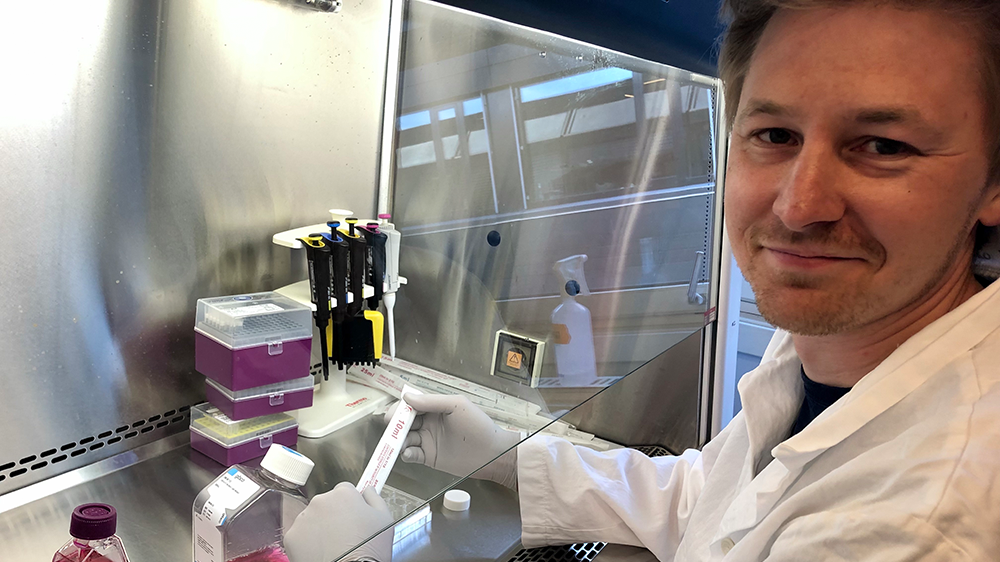“More than 1,000 Norwegians need heart valve surgery each year because of calcification. We don’t know why the calcification process starts, and the only treatment we have so far is replacement, which needs to be performed again in 10-15 years in case of biological valve implant or requires lifelong anticoagulation therapy in case of mechanical valve implant ”, explains Zabirnyk.
“Wouldn’t it be great if we could find drugs to prevent the calcification? That’s what we want to achieve”, he states.
Zabirnyk together with his supervisors have developed the project to find a drug to treat calcification when working with the Heart Physiology group as a Scientia Fellow. They are working with cells from patients’ heart valves, and they isolate and culture the cells in order to test various molecules so that they can find the ones that stop calcification. They have already identified some good candidates.
Read more on the Digital Life website
Scientia Fellows promotes mobility
Arsenii Zabirnyk was a promising Ukrainian biologist working in a joint project in Kharkiv (Ukraine) and Saint Petersburg (Russia) when he got acquainted with Jarle Vaage, professor emeritus at UiO. The Faculty of Medicine and Vaage have had a long and fruitful collaboration with the Almazov institute in St. Petersburg.
Vaage worked with Kåre-Olav Stensløkken in the Heart Physiology group at the University of Oslo, and they suggested Zabirnyk to apply for a Scientia Fellows position in the research group. Scientia Fellows is an EU cofund at the UiO that promotes international mobility, excellent research and career-enhancing programmes.
“Receiving a Scientia Fellowship represents a great opportunity to be able to perform research at a high level, to experience Norwegian research culture, and to access prominent career-enhancing programmes. The Marie Curie status is also great for your CV”, says Zabirnyk, who continues:
“My fellowship had a duration of two years. That was not long enough to complete the research, but it was long enough to see the potential and start the innovation project”, says Zabirnyk.
Fortunately, Vaage, his supervisor, and Stensløkken as group leader saw the potential as well.
“For a long time, I considered basic research and commercialisation as contradictions. Basic science is about publishing your findings to the world, while commercialisation is about protecting rights to ideas. Working on this project with Arsenii and Jarle made me realise that these are not necessary contradictory, but that they can build on and should complement each other”, says Stensløkken.

Career development and the School of Health Innovation
The continuing struggle to get funding for research also “helped” the group to continue the innovation project.
“I attended both course 1 and 2 at the School of Health Innovation, and we got the idea to apply for innovation grants. We successfully applied for several of those grants. The School of Health Innovation is extremely helpful if you have an idea or an innovation project. This and the postdoc programme at the Faculty of Medicine are another reason why the Scientia Fellows programme is great to be part of”, says Zabirnyk.
«I was lucky enough to have Jarle and Kåre-Olav who strongly supported me on the way and were open to start the innovation process. The Faculty of Medicine and UiO are investing a lot of efforts in innovation of research, which is a huge support”
Need for the right support and collaborators
In 1960, for the first time, an artificial heart valve was operated into a patient, which saved his life. Arsenii Zabirnyk’s natural drive to move research from the bench to the bedside makes him want to go beyond all the data and research done since then and treat the cause of calcification.
“Health innovation processes can take five to ten years, and even then, maybe nothing will come out of them. But when we see the effect of some of these tedious research process, with new vaccines or clinical practices, we can’t afford to not try.”
Zabirnyk emphasises the need to both conduct basic research and see innovation potential, as well as the importance of getting a lot of help along the way.
“We started working with Invent2 (UiO’s TTO), but the project was not mature enough. However, in January 2020, we got accepted to SPARK, and that has been very helpful.”
“We started in the autumn, because of the coronavirus, but having a mentor with experience from pharma opened a lot of opportunities. We also won an opportunity with EU-Openscreen, which will increase our test capacity enormously”, says Zabirnyk.
“We have a lot of confidence and belief in our project, but we are dependent on having continuous funding and the right collaborators during the years to come”, Zabirnyk concludes.
